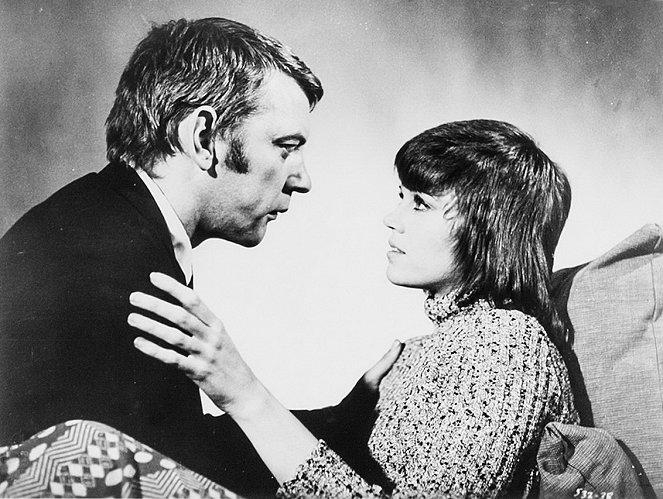Directed by:
Alan J. PakulaCinematography:
Gordon WillisComposer:
Michael SmallCast:
Jane Fonda, Donald Sutherland, Charles Cioffi, Roy Scheider, Dorothy Tristan, Rita Gam, Nathan George, Vivian Nathan, Richard B. Shull, Veronica Hamel (more)Plots(1)
A low-key small town detective journeys to New York City to investigate the murder of a friend and discovers that both the killer and the victim were clients of the same high-class call girl. (official distributor synopsis)
Reviews (3)
I evaluate Klute with a greater time interval, however, even from that distance I distinctly remember the slowly flowing plot, when I was already desperate and secretly hoped that something would happen to the main heroine and my suffering would be over. I couldn't identify with the character portrayed by Jane Fonda, on the contrary, I couldn't believe her value system in connection with her profession, even though the actress really tried. Overall impression 50%.
()
Klute is a breathtaking and uniquely original film – that is, if the viewer gives it a chance and, ideally, approaches it without any expectations or foreknowledge. That may not be easy, given the film’s misleading title. John Klute is not the main character, but rather only a key catalyst of events. On the other hand, the title helps to point out that the film is connected with the noir genre and, in the spirit of other movies of the time, such as The Long Goodbye and Night Moves, does not fulfil the criteria of that genre in its classic form, but rather subversively deconstructs it and transforms it into something extraordinary. Despite the original screenplay (which in the traditional spirit was about a small-town cop who gets mixed up with criminals in New York), the film focuses not on the detective, but rather on the femme fatale, who is not dealt with as an object, but rather as a complex and complicated character. Pakula acknowledges that Klute thus violates the Hitchcockian rule of genre films by focusing on psychology instead of attractions (Klute inadvertently sets forth the difference between the true sophistication of the character and the bluffing superficial psychologisation of characters in modern sophisticated genre movies and blockbusters). Bree Daniels, played by Jane Fonda, thus becomes the central character and through genre elements the film is immersed in the issues of sex as a power play and seduction as acting based on control over others and over the situation, but it mainly becomes a portrait of this woman. The actress, for whom, after the phenomenal They Shoot Horses, Don’t They?, this was the second role illustrating her personal growth into a mature, emancipated woman, contributed significantly to the final form of the film. At her request, she not only spent time with real call girls, took a large part of the costumes from her own wardrobe and even lived on the set of the protagonist’s apartment for several days before shooting began, but she also took an improvisational approach to a number of scenes in order to fully get into them. So, why isn’t the film called Daniels? Because for the confident yet self-doubting woman, the detective is a mirror of the contrast of both her outward image and her inner self, her control and helplessness, or simply her ambiguity, which she herself tries to cope with. Despite its title, Klute is not only a milestone in American cinema from the perspective of female protagonists, but a departure from traditional genre formulas and rules, which is represented by the emancipatory, ground-breaking nature of the film’s female character and the verbalisation of her perspective. Alan J. Pakula always highlighted Jane Fonda’s merits as well as contribution that other members of the creative team made to the final form of the film. Klute is thus a representation of the ideal of a film as a collective work, where the director does not bend the will of other members of the crew to his vision, but is rather guided by the inspiration and talent of others. Cinematographer Gordon Willis made an incredible contribution to the film with his incredibly sophisticated fragmented compositions, dramaturgically motivated camera approaches and expressively gloomy lighting, and composer Michael Small created disturbing, paranoid music mixed with the commotion of the scenes. In addition to the contrapuntal editing and the costumes with a feel for the authenticity of New York and presentation of the characters, Donald Sutherland, with his restrained performance, helped to shape the titular protagonist into the role he was supposed to have in this story. Narratively and stylistically, Klute goes beyond the boundaries of noir alternately into the realms of thriller and romance, offering an absorbing, chilling and unique viewing experience (the scene involving shopping for fruit is breathtaking due to its intimacy and fragility in showing love, while again displaying the astonishing interplay of all of the above-mentioned creative forces).
()
(less)
(more)
I have a problem with this movie in that it simply presents a subject matter that should be suspenseful but in reality, it is a film that is minimally suspenseful and tries to impress mainly with scenes that are well acted - no doubt about that - but they simply do not create a whole that would be so satisfying for the audience, it simply goes its own way.
()

